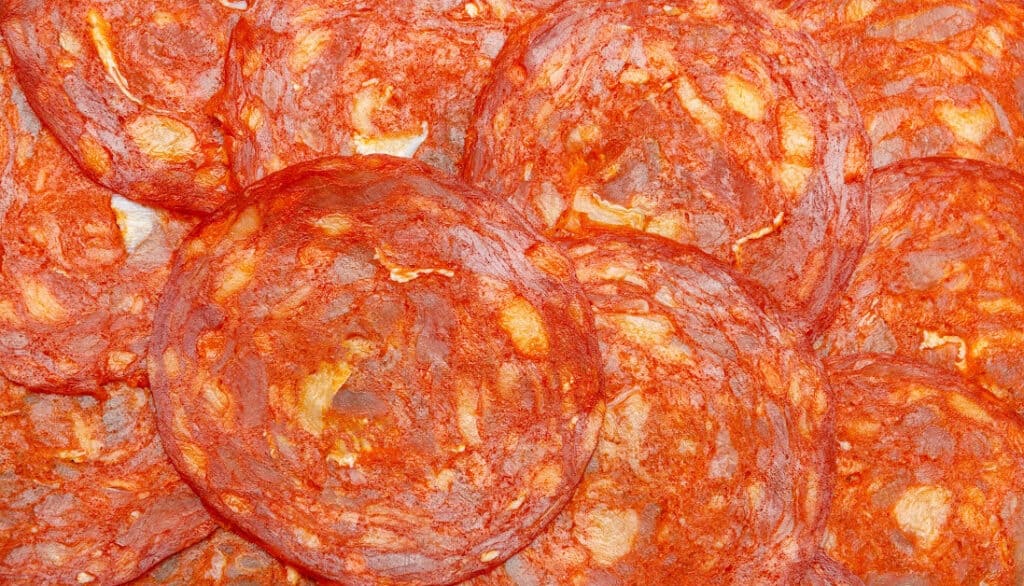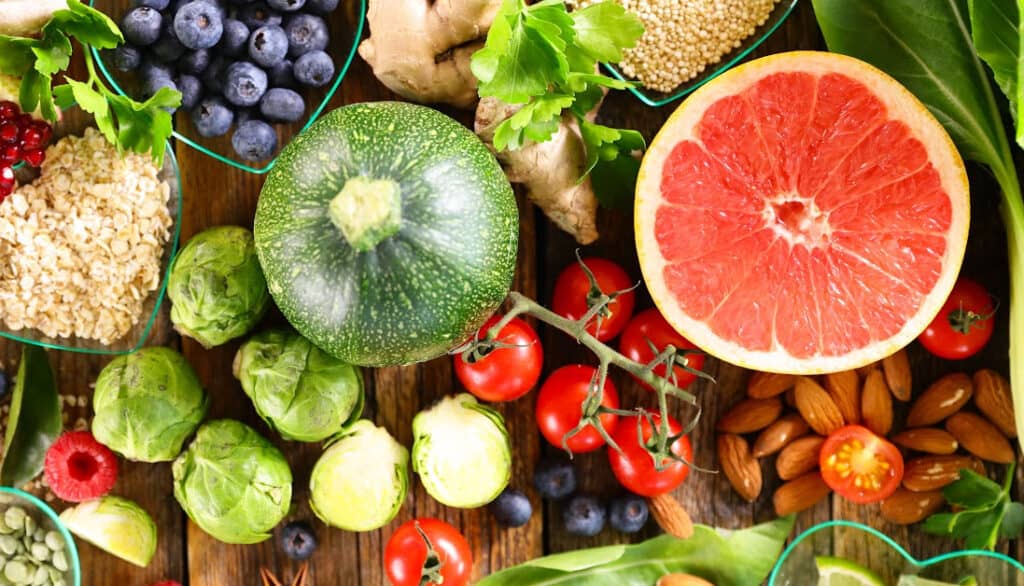Pepperoni, a common pizza topping and ingredient in Italian cuisine, might appeal to our canine companions, but is it safe for them? Can dogs eat pepperoni? The simple answer is no. Dogs’ adoration for human food and their beguiling stares during our meals might suggest otherwise, but not all human food is safe for dogs. Some can even be toxic or potentially lethal.
Pepperoni isn’t recommended for dogs chiefly due to its high fat content. Dogs need a specific nutrient balance for optimal health, and excessive fat can result in weight gain, obesity-related issues such as joint problems or diabetes. Additionally, pepperoni’s high sodium content is concerning, as excess sodium can cause dehydration, potentially leading to kidney issues and heart disease. While sparingly feeding your dog small amounts of plain, cooked pepperoni might not be harmful, caution is advised.
If in doubt about your pet’s dietary safety, especially considering underlying health conditions, consult a veterinarian before introducing human food to their diet. It’s crucial for pet owners to be aware of potentially harmful ingredients in human foods and maintain appropriate portion control.
Resisting the urge to share pepperoni pizza with your pet is recommended, instead opt for healthier, specially formulated canine treats and snacks. Always consult a veterinarian if you’re uncertain about dog-safe foods.

The Truth About Dogs and Pepperoni
The Potential Risks of Feeding Pepperoni to Dogs
Pepperoni is a popular ingredient in many human foods, but it’s not always safe for dogs to eat. One of the biggest risks associated with feeding pepperoni to dogs is its high fat content.
The fat in pepperoni can be difficult for dogs to digest and can lead to various health problems. For example, pancreatitis, obesity, and gastrointestinal issues. Another potential risk of feeding pepperoni to dogs is its high sodium content.
Salt intake can cause dehydration, increased thirst, and other health problems if consumed in excess by your furry friend. Dogs who consume too much salt may experience vomiting, diarrhea, or even seizures.
Small Amounts of Cooked Pepperoni May Be Safe for Some Dogs
While there are risks associated with feeding pepperoni to dogs, some dog owners wonder if small amounts are okay. In moderation, plain cooked pepperoni may be okay for some dogs who do not have any underlying health issues. However, it’s crucial to keep in mind that moderation is key.
Feeding too much pepperoni can lead to the potential health risks mentioned earlier in this article. If you do decide to feed your dog small amounts of cooked pepperoni as a treat or reward make sure that it doesn’t contain any additional ingredients like garlic or onions as these can be harmful.

Implications on Your Dog’s Health
We adore our pets and wish for their long, healthy lives. Sadly, spoiling them with fatty treats can harm them. Foods like bacon or sausage can reduce their lifespan. These treats may also increase their risk of diseases like diabetes and heart disease.
Today, obesity in pets is a growing concern. It’s mainly due to owners feeding their pets with human-grade food. These foods are often high in unhealthy fats and calories. Many owners don’t realize this practice is harmful to their pets.
Feeding your dog excessive pepperoni is harmful too. It can cause stomach upset and vomiting. Too much fat may also inflame their pancreas. This condition can be life-threatening.
What You Can Do If Your Dog Consumes Pepperoni
If your dog has accidentally consumed pepperoni or any other food that may be harmful, it’s important to monitor them closely for any signs of distress or illness. Contact your veterinarian immediately if you notice any unusual behavior such as vomiting, diarrhea, lethargy or a loss of appetite.
While dogs may love the taste of pepperoni it’s important to remember that it’s not always safe for them to eat. The risks associated with high-fat and high-sodium content are serious and can lead to a variety of health problems in dogs.
If you want to treat your furry friend make sure that you do so responsibly and in moderation. Remember, a healthy diet is crucial for keeping our pets happy and healthy!

Health Benefits and Risks of Feeding Pepperoni to Dogs
How the High Fat Content in Pepperoni Can Lead to Obesity and Other Health Issues in Dogs
Pepperoni is a greasy, high-fat food that can cause significant health problems when fed to dogs regularly. It is essential to understand that dogs cannot metabolize fat as efficiently as humans can, and overfeeding them with fatty foods like pepperoni can lead to obesity.
Obesity is a major health concern for dogs, contributing to arthritis, heart disease, respiratory problems, diabetes mellitus, cancer, and other risky conditions. Besides being high in fat content, pepperoni also lacks the necessary nutritional value that dogs need to stay healthy.
Feeding your furry friend with such a nutritionally inadequate diet can lead to malnourishment and weaken their immune system. Therefore always ensure that you stick with recommended kibble diets for your dog’s daily meals.
How Excessive Sodium Intake Can Cause Dehydration and Other Health Problems in Dogs
Most commercial pet foods already have salt content required by the dog’s body; therefore adding an extra sodium intake from pepperoni treats could be harmful. The sodium content found in processed meats like pepperoni can cause dehydration leading to kidney disease or other life-threatening conditions.
Dogs require hydration just like humans; however excessive consumption of salt expels water from their cells more than necessary hence causing dehydration. This condition reduces kidney function leading to further health issues such as bloating or even death.
Hence, it’s best to offer salt-free pepperonis or dog-safe treats. Feeding dogs human food without a vet’s guidance can lead to serious problems.
Consulting a vet will inform you about your dog’s dietary needs. These needs can change due to age or health issues.
Always meet your dog’s nutritional needs. Keep them healthy with the right food and regular exercise.

Alternatives to Feeding Pepperoni to Dogs
Lean Meats like Chicken or Turkey
When looking for alternatives to feeding pepperoni to your furry friend, a great option is lean meats like chicken or turkey. These meats are much lower in fat and sodium than pepperoni, making them a healthier choice for your dog.
Not only are these meats delicious to dogs, but they are also packed with protein, which is essential for building and maintaining strong muscles. If you want to add some variety to your dog’s diet, consider cooking up some lean ground turkey or chicken breast and using it as a treat or meal topper.
You can even mix it with their regular kibble for an added protein boost. Just be sure not to add any seasoning or spices that could upset their stomach.
Commercially Available Dog Treats
There are many commercially available dog treats on the market today that are specifically formulated for canine nutrition. These treats come in all shapes and sizes and can be found at most pet stores.
When choosing a dog treat, be sure to read the label carefully and look for treats that are made with high-quality ingredients. Avoid treats that contain artificial preservatives or additives, as these can be harmful to your dog’s health.
One popular brand of dog treats is Greenies Dental Chews. These tasty treats not only satisfy your dog’s craving for something chewy, but they also promote healthy teeth and gums by scraping away plaque and tartar buildup.

Fruits and Vegetables
Believe it or not, there are many fruits and vegetables that dogs love just as much as meat-based treats. Some examples include carrots, green beans, apples (without the seeds), bananas (in moderation), blueberries (also great frozen!), pumpkin puree (not pumpkin pie filling), sweet potatoes (cooked), watermelon (without the seeds), and strawberries. Not only do these fruits and vegetables provide a healthy alternative to traditional dog treats, but they also offer a variety of vitamins and minerals that are essential for your dog’s overall health and well-being.
Dental Chews
Dental chews are another great alternative to feeding pepperoni to your dog. Not only do they satisfy your dog’s natural urge to chew, but they also promote healthy teeth and gums by scraping away plaque and tartar buildup.
When choosing a dental chew, look for one that is made with high-quality ingredients and is specifically formulated for canine dental health. Some popular brands include Pedigree Dentastix, Merrick Fresh Kisses, and Blue Buffalo Dental Bones.
Homemade Dog Treats
If you’re feeling adventurous in the kitchen, consider making homemade dog treats as an alternative to feeding pepperoni to your furry friend. There are many recipes available online that are easy to make and use simple ingredients like peanut butter, oats, eggs, and flour.
Just be sure not to add any spices or seasonings that could upset your dog’s stomach. And always consult with your veterinarian before introducing any new foods into your dog’s diet.

Final Thoughts: Can Dogs Eat Pepperoni?
The article primarily addresses whether dogs can consume pepperoni, a common pizza topping. In moderation, some dogs may tolerate small portions of cooked, unseasoned pepperoni. However, the food carries potential health risks due to its high fat and sodium content, which could lead to obesity, dehydration, and other health problems in dogs. Hence, excessive feeding of pepperoni is harmful and should be circumvented.
Instead of pepperoni, healthier alternatives like lean chicken or turkey meat can be provided as treats. Numerous commercially manufactured dog treats are also available that are specially designed to cater to a dog’s nutritional requirements. Prior to introducing new foods into a dog’s diet, it’s crucial to consult a veterinarian, as every dog has distinct nutritional needs contingent upon their breed, age, weight, and overall health condition. A vet can provide personalized advice on suitable foods for your dog.
It’s equally vital to observe your pet’s behavior and physical response to new foods. If they exhibit any signs of illness, such as vomiting or diarrhea, discontinue the food immediately. While we may desire to share our favorite human foods with our pets out of affection, their health must always take precedence. By focusing on their dietary needs and seeking professional advice before making significant dietary alterations, we can promote a long, healthy life for our cherished companions.
~Sheena
